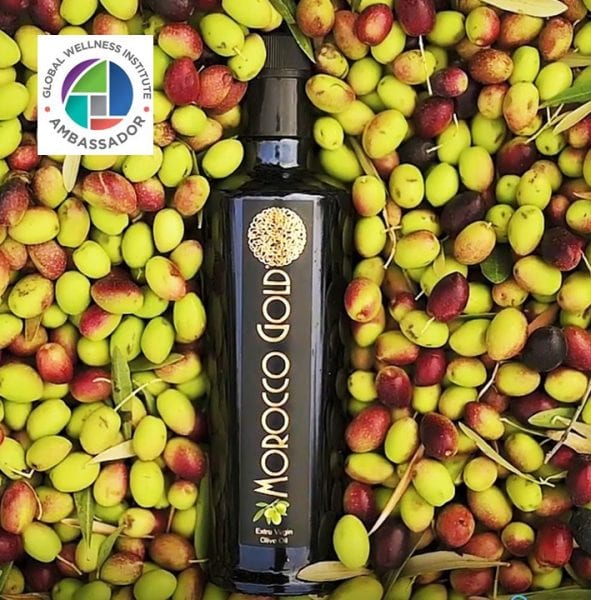Research Suggests Mediterranean Diet Followers 57% Reduced Breast Cancer Risk
Updated August 14th 2024

Summary
- Extra virgin olive oil, also known as EVOO, is widely recognized as a staple of the Mediterranean diet.
- Extra virgin olive oil is prized for its rich flavour and versatility in cooking, but also for its numerous health benefits.
- The polyphenols in extra virgin olive oil are powerful antioxidants that can help protect against cancer. Studies have shown that extra virgin olive oil (EVOO) can help reduce the risk of breast cancer, a disease that affects millions of women worldwide.
- It is important to choose the best olive oil and incorporate it into your diet to reap the full benefits of this superfood.
Contents
How Extra Virgin Olive Oil Helps Combat Breast Cancer
The Mediterranean Diet, including healthy fats like extra virgin olive oil, is renowned for helping to keep our hearts healthy and maintain a healthy weight. But, did you know that it could also play a crucial role in reducing breast cancer risk? In this post, we’ll explore how the Mediterranean diet, rich in extra virgin olive oil, contributes to women’s health and wellness. Get ready to discover the science behind this powerful combination and how it might just be the secret ingredient to a healthier life.
The Science Behind Breast Cancer and Nutrition
Breast cancer is one of the most common cancers affecting women worldwide. Research has shown a link between diet and breast cancer risk, with certain dietary patterns offering protective benefits. The Mediterranean diet, with its emphasis on plant-based foods and healthy fats, is thought to help reduce the risk of breast cancer.
Studies suggest that the anti-inflammatory and antioxidant properties of EVOO play a role in cancer prevention. These compounds help protect cells from damage and reduce the risk of mutations that could lead to cancer development. In addition, the Mediterranean diet’s overall nutrient density supports immune function and hormonal balance, both of which are crucial in reducing cancer risk.
While no single food or diet can guarantee cancer prevention, adopting a Mediterranean lifestyle may contribute to a lower risk of developing breast cancer. By focusing on whole foods and healthy fats, individuals can support their overall health and well-being.
Study Links Effects Of Extra Virgin Olive Oil On Breast Cancer
Extra virgin olive oil (EVOO) is a staple in the Mediterranean diet, and for good reason. It’s rich in monounsaturated fats, which are known to improve heart health and reduce inflammation. EVOO also contains a wealth of antioxidants, including vitamins E and K, as well as polyphenols, which help protect the body from oxidative stress.
The quality of Extra Virgin Olive Oil sets it apart from other oils. It is minimally processed, retaining its natural colour, flavour, and nutrients. This makes it an ideal choice for enhancing the taste of your dishes while providing numerous health benefits. Its versatility in cooking and raw applications further solidifies its role as a key ingredient in Mediterranean cuisine.
Using EVOO in your daily diet can lead to numerous health benefits, from improving cholesterol levels to supporting brain health. Its unique composition of healthy fats and antioxidants makes it a powerful ally in maintaining overall wellness.
In a study carried out by Dr Javier Menendez and colleagues from the Catalan Institute of Oncology in Spain to investigated the effects of extra virgin olive on breast cancer cells grown in laboratory cultures, it was shown that the substances in extra virgin olive oil work in a similar way to the drug Herceptin by reducing the concentration of HER2 protein that helps HER2-positive breast cancer to grow.
Using a method called solid phase extraction, researchers extracted the polyphenols from commercially available extra virgin olive oil. These were then added to the growth medium for HER2-positive and HER2-negative breast cancers to see what effect they had on the tumour cells.
They found that the polyphenols from the extra virgin olive oil reduced the levels of HER2 protein and also increased tumour cell death. HER2 is a protein found on the surface of some cancer cells. This protein can bind to another molecule (known as human epidermal growth factor), which then encourages the growth and division of the tumour cells. Not all have the HER2 protein on their surface; it is estimated that one in five women with breast cancer will have HER2 receptors.
Several laboratory tests were then carried out to determine how fast the tumour cells were growing, their metabolic activity, whether the phenol caused cell death, whether the phenol had an effect on levels of HER2 protein and whether or not HER2 protein was activated in the presence of the phenol. The results from these tests were compared with those from tests performed on breast cancer cells that were not cultured with the phenols.
How The Polyphenols In Extra Virgin Olive Oil Can Get To Work
This study found that polyphenols extracted from extra virgin olive oil have an effect on HER2-positive breast cancer cells grown in culture in the laboratory. The researchers found that some single phenolic compounds (including hydroxytyrosol, tyrosol and others) and all the polyphenols (several phenols joined together) from extra virgin olive oil induced “strong tumouricidal effects” in breast cancer cells that had HER2 protein on their surface. The phenols also reduced the levels of HER2 protein and its activation.
The researchers concluded that the polyphenols in extra virgin olive oil have the ability to cause degradation of the HER2 protein on breast cancer cells. This may mean they can be used as a basis for the design of new HER2-targeting agents.
New Study Shows Benefits Of Mediterranean Diet With Extra Virgin Olive Oil
A recent case-controlled study conducted in Iran and published on Frontiers in Nutrition found a significant inverse association between the Mediterranean diet and breast cancer.
According to a summary in MindBodyGreen.com, this research shows individuals with the highest tertile of the Mediterranean diet score compared with those in the lowest tertile were 57% less likely to have breast cancer1. This relationship was most significant among postmenopausal women and the research claims the diet’s anti-inflammatory, estrogen-supportive, and antioxidant properties are most likely to be driving this impact.
It goes on to explain the significance of this study, saying:
Previous studies on the association between diet and breast cancer are mostly from Western populations where data from Middle East countries was not often included, hence why this study specifically set out to gather data on Iranian women, as the prevalence of breast cancer in Middle East countries is high2, yet the analytic data available is quite low.
The classic Mediterranean diet focuses on eating real, whole foods and is modeled after countries lining the Mediterranean Sea. It centers fruits, vegetables, whole grains, beans, legumes, nuts, seeds, olive oil, herbs, and spices and limits processed foods, red meat, and added sugars.
For this study, researchers enrolled 350 women with new cases of breast cancer (including stages I-IV) and 700 women to represent a control group with equal socioeconomic and age status.
A nutritionist then evaluated dietary intake using a 106-item Willett-format semi-quantitative dish-based food frequency questionnaire (SQ-FFQ), which was specifically created and validated for the Iranian population to create scores based on how closely participants follow the Mediterranean diet.
They computed scores of the Mediterranean diet based on nine diet components, including servings of fish, fruits, vegetables, legumes, nuts; ratio of monounsaturated fatty acids (MUFAs) to saturated fatty acids (SFAs); and negative components, including grains, dairy, meats (including poultry and red meat) and processed meat. They then added those scores together to get the total Mediterranean diet value.
Our findings were aligned with the findings from a case-control study conducted by Turati et al. in Switzerland in which adherence to the Mediterranean diet was inversely associated with the risk of breast cancer3.
MindBodyGreen
Regional studies like these are important, as dietary patterns vary greatly from country to country.
Why Is The Mediterranean Diet So Healthy?
The Mediterranean diet is renowned for its heart-healthy benefits. It’s characterized by an abundance of fruits, vegetables, whole grains, and healthy fats, particularly from extra virgin olive oil. This diet also includes moderate amounts of fish, poultry, and dairy, along with limited red meat and sweets. But it’s not just about what you eat—it’s also about how you eat. Sharing meals with family and friends, enjoying a variety of foods, and savoring each bite are all integral aspects of this dietary pattern.
The Mediterranean lifestyle promotes a holistic approach to health, focusing on balance and enjoyment. It’s no wonder that the people of the Mediterranean region have longer life expectancies and lower rates of chronic diseases compared to other cultures. This emphasis on fresh, whole foods and healthy fats provides a foundation for overall well-being.
Ultimately, the Mediterranean diet is more than a meal plan; it’s a lifestyle that encourages a healthy relationship with food. By incorporating diverse, nutrient-rich foods, individuals can enjoy meals that are both delicious and beneficial for their health.

The Mediterranean Diet has been associated with so many potential health benefits including improved cardiovascular function, brain health and reduced inflammation. While the exact science behind why it may contribute to possible prevention of breast cancer are unclear, researchers note this protective effect may be due to the following:
- Anti-inflammatory properties: The Mediterranean diet contains foods that are high in MUFAs and omega-3 fatty acids4, both of which have anti-inflammatory properties. “Inflammation is an important risk factor in the incidence of breast cancer5,” researchers say.
- Estrogen support: The Mediterranean diet is also rich in compounds that are known to support estrogen metabolic pathways and have estrogen-modulatory effects, which are protective against breast cancer, researchers say. This includes dietary fiber6, flavonoids, lignans, and resveratrol7.
- Antioxidants: Finally, the Mediterranean diet is chock-full of antioxidants from fruits and vegetables, which also may have protective effects against breast cancer8.
More studies are needed to confirm these findings across different populations and dive deeper into what, exactly, makes this diet potentially cancer-protective.
The Mediterranean Diet has been praised as one of the healthiest diets in the world, and it’s not hard to see why. This way of eating, which is rich in fruits, vegetables, whole grains, lean proteins, and healthy fats, has been associated with a plethora of health benefits. One reason for this is that the Mediterranean Diet is low in processed foods and added sugars, which are linked to several negative health outcomes. Additionally, this diet is high in nutrients that are important for overall health, such as fiber, antioxidants, and omega-3 fatty acids.
Finally, the Mediterranean Diet promotes a well-balanced and varied approach to eating, which can help people maintain a healthy weight, reduce inflammation, and lower their risk of chronic diseases such as heart disease, diabetes, and certain types of cancer.
MindBodyGreen expressly noted that this research doesn’t mean following the Mediterranean diet will prevent breast cancer point blank. However, it does further support the power of eating whole foods, lean proteins, and healthy fats for overall health.
Conclusion
The Mediterranean diet, enriched with extra virgin olive oil, offers a powerful strategy for enhancing health and reducing the risk of breast cancer. By adopting this lifestyle, individuals can enjoy delicious, nutritious meals while supporting their overall well-being.
We encourage you to explore the Mediterranean diet and incorporate its principles into your daily life. Whether you’re seeking to improve your health, explore new flavors, or connect with a supportive community, the Mediterranean lifestyle offers a wealth of benefits.
For those looking to learn more, consider seeking out additional resources or connecting with a nutritionist specializing in Mediterranean cuisine. Equip yourself with the knowledge and tools you need to make positive, lasting changes to your health.
For more tips on how to get started on the Mediterranean Diet and some healthy recipe ideas, pop over to Morocco Gold here.
